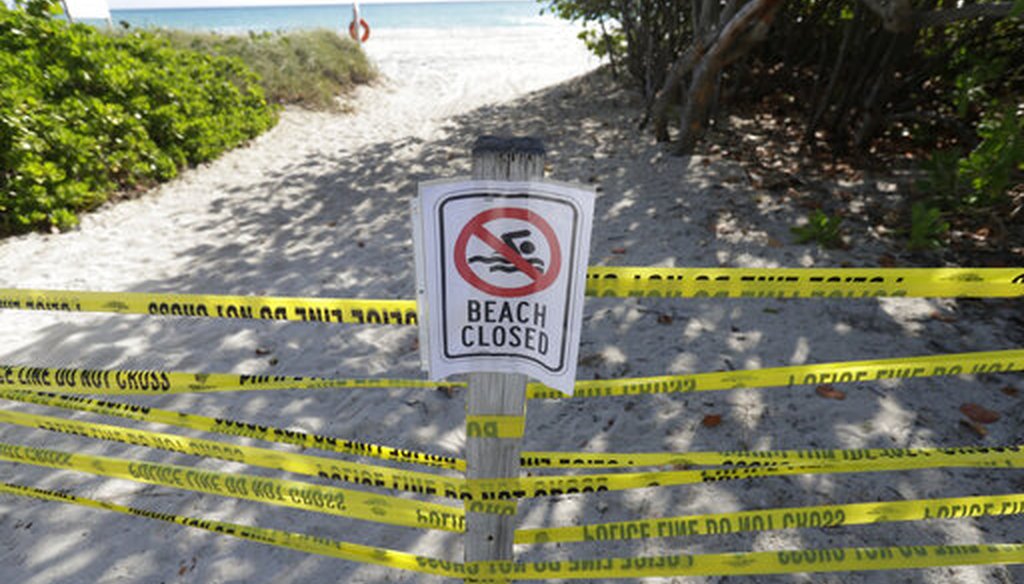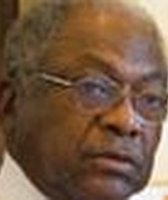Stand up for the facts!
Our only agenda is to publish the truth so you can be an informed participant in democracy.
We need your help.
I would like to contribute

A beach entrance is cordoned off, Saturday, March 21, 2020, in Surfside, Fla. Miami-Dade County's mayor ordered all beaches, parks and "non-essential" commercial and retail businesses closed Thursday because of the new coronavirus pandemic. (AP)
If Your Time is short
-
Many governors nationwide have issued statewide stay-at-home orders due to the coronavirus. Florida Gov. Ron DeSantis says a statewide policy isn’t needed.
-
DeSantis has deferred to local officials, some of whom have crafted their own orders in heavily hit areas, including South Florida.
-
As for rural counties, health experts say that just because a county has few positive test results so far doesn’t mean that the virus isn’t spreading there.
Many of the states with more than 1,000 coronavirus cases have told their residents to stay at home to limit the spread.
Not Florida. Gov. Ron DeSantis is against it.
DeSantis prefers a "surgical" approach, with measures tailored for the hardest-hit counties that spare ones with few or zero cases from the economic hardship of a mandatory shelter-in-place.
"Some people think that the governor should just be a dictator and just order everyone in prison in their homes," he said March 24. "And I don’t think that would be an effective approach, but it’s certainly not warranted in certain parts of the state. So everyone’s doing their part and I think that’s going to be the better approach."
The Republican governor’s decision stands apart from those made by governors in New York, California and Louisiana, and so Democrats at all levels have taken notice. The criticism comes from local leaders, like St. Petersburg Mayor Rick Kriseman, state Agriculture Commissioner Nikki Fried, several members of Florida’s congressional delegation, and presidential candidate Joe Biden.
"While other large states continue to take strong, urgent, and sweeping action to stop the spread of COVID-19, Florida has not," Biden said. "I urge Gov. DeSantis to let the experts speak to the public and explain why this is the case."
The pressure isn’t just political, however. It’s also coming from health care workers and public health experts.
They point to scientific models that show less action leads to more infections and death, and they warn that the situation in Florida’s rural regions may not be what it appears.
Florida had the seventh-highest number of cases in the country as of March 27, and we haven’t seen signs of a turnaround. So we wanted to lay out DeSantis’ arguments against a shelter-in-place order statewide and talk to health experts about potential consequences for a full picture of the current situation.
Why DeSantis doesn’t want a statewide order
DeSantis’ philosophy is to not interfere in areas with "sporadic cases," and to focus more tightly on areas of concern.
Twenty-one of Florida’s 67 counties had zero positive COVID-19 tests as of March 27, mainly in the northern region of the state. About half of Florida’s cases are in Broward, Miami-Dade and Palm Beach counties.
In that part of the state, DeSantis has taken more action. For example, he issued more stringent orders for Broward and Palm Beach counties, closing beaches and limiting restaurants to delivery or take-out. The order aimed to put the counties in line with an order already set by Miami-Dade County.
Several larger counties enacted their own stay-at-home policies, including Pinellas, Hillsborough and Broward, and DeSantis has emphasized his willingness to "work with any of the local communities."
Business leaders are supporting DeSantis' approach at a time when claims for unemployment in the state have already shattered records without a statewide order.
DeSantis and President Donald Trump appear to be on the same page, too. Trump has called for classifying counties as low, medium or high risk across the country so the government can better focus its response, allowing places with low or no cases to resume normal activities.
DeSantis has also pointed to comments by Dr. Anthony Fauci, a key adviser to the White House on COVID-19. In a TV interview, Fauci said that a stay-at-home order isn’t needed for every single region in the nation. Fauci was not asked about Florida specifically.
Why health experts argue for a statewide policy
The calls for a statewide stay-at-home order have been mounting. More than 900 Florida health care workers signed a letter to DeSantis on March 27 urging him to issue an immediate statewide shelter-in-place order.
"Strict limitation of social contact is the only hope of limiting peak incidence and overall mortality rates, as can be seen empirically from other countries," the letter says.
Stay-at-home orders across the country vary in scope and enforcement. In general, residents can still go to the grocery store and pharmacy and can also exercise outdoors. And people with jobs deemed "essential" (here’s California’s, for example) can still go to work.
While DeSantis has issued orders that limit group gatherings, experts raised several concerns about a lack of uniform rules statewide.
Rural county test results may not reflect reality. The fact that there are few, or even zero, reported cases in some counties doesn’t mean there are few or zero cases. It means that is what test results show, so far.
By the time someone is so sick that they get a test and it shows positive, that person could have spread the virus to multiple people over a couple of weeks.
"It's very likely that the virus is circulating in parts of the state that haven't reported cases yet," said Cindy Prins, an epidemiology professor at the University of Florida. "If stay-at-home orders in Florida differ from city to city or county to county, then it's like plugging one leak in a pipe while letting other leaks remain. The end result is that you still have leaks and are still risking a flood."
The situation is rapidly evolving. Natalie Dean, a University of Florida biostatistics professor said she would recommend a statewide stay-at-home order because the full picture in Florida is not really known. Like the country, the state was slow to start testing, which remains limited.
"It’s better to overreact early and ease up than to underreact and try to catch up," she said.
It’s still easy for people to leave their counties. A stay-at-home order in one community can prompt people to leave for another community.
"If we do piecemeal, we risk infecting other communities that are not infected, because it will tell people, ‘Well in my county I can't do this, but I can do it in the next county,’ Tracy Zontek, associate professor of public health at the University of Tampa who called for a statewide approach, told WUSF. "So the piecemeal approach is really going to increase our number of cases because we won't have controlled anything."
The health care system could be overwhelmed. A key reason why medical experts have urged people to stay at home is that they fear running out of hospital beds and medical equipment including ventilators and supplies.
Some people cite the Covid Act Now model, created by health officials and data scientists to anticipate the points of hospital overload and deaths as a result of a specific state policy over three months. It has limitations, as it is based on early estimates and does not account for strict local measures. (The model is "designed to drive fast action, not predict the future," the methodology states.)
That model offers a bleak outlook for Florida with a largely voluntary approach of social distancing. To prevent hospital overload, it says a statewide shelter-in-place model should be implemented by April 17-22.
And in Florida, that action should include a unified and strict stay-at-home policy, said Nirav Shah, a Stanford medical professor and former commissioner of the New York State Department of Health who helped develop the model.
Our Sources
Covid Act Now, Florida and methodology, March 23, 2020
Gov. Ron DeSantis, Executive orders including order 20-68 and order 20-70, March 2020
U.S. Rep. Ted Deutch, Tweet, March 24, 2020
Several U.S. House Democrats from Florida, Letter to Gov. Ron DeSantis, March 25, 2020
White House, Remarks by President Trump, Vice President Pence, and Members of Coronavirus Task Force in Press Briefing, March 24, 2020
Sun Sentinel, South Florida vs. the rest of Florida? Geographic split emerges on calls for stay-at-home order, March 25, 2020
Florida Agriculture Commissioner Nikki Fried, Statement by Commissioner Nikki Fried Asking Governor DeSantis for Statewide "Stay at Home" Order, March 20, 2020
New York Times, See Which States and Cities Have Told Residents to Stay at Home, March 25, 2020
New York Times, Coronavirus in the U.S.: Latest Map and Case Count, March 27, 2020
Washington Post, Why Trump won’t have the final say on whether people go back to work, March 25, 2020
Tampa Bay Times, Florida’s Ron DeSantis more cautious than other governors on coronavirus, March 21, 2020
Tampa Bay Times, Gov. Ron DeSantis won’t shut down Florida. Here’s who he’s talking to about that. March 25, 2020
REV, Florida Governor Ron DeSantis Coronavirus Briefing Transcript, March 24, 2020
Florida Department of health, COVID cases, Accessed March 26, 2020
Florida Agriculture Commissioner Nikki Fried op-ed in Tallahassee Democrat, Florida needs stay-at-home order before it's too late, March 24, 2020
Miami Herald, Dozens of Miami doctors plead with city to stay inside and take coronavirus seriously, March 23, 2020
WUSA9, VERIFY: 'Coronavirus Act Now' charts use real data to estimate worst-case scenario, March 23, 2020
CBS, "Very difficult to predict" how long "stay-at-home" orders will last, Dr. Fauci says, March 20, 2020
Tampa Bay Times, Your questions on Pinellas and Hillsborough’s stay at home orders, answered, March 25, 2020
Tampa Bay Times, 850 Florida healthcare workers urge Gov. Ron DeSantis: ‘Act now’ March 27, 2020
Tampa Bay Times, Florida unemployment claims explode amid coronavirus layoffs, March 26, 2020
WUSF, Public Health Expert To DeSantis: Florida Needs Statewide Stay-At-Home Order, March 25, 2020
Politico, Biden blindsides Trump’s Florida ally, March 25, 2020
Email interview, Cody McCloud, Gov. Ron DeSantis spokesman, March 25, 2020
Email interview, Jason Attermann, U.S. Rep. Ted Deutch spokesman, March 26, 2020
Email interview, Volker Mai, University of Florida Associate Professor, Department of Epidemiology, March 26, 2020
Email interview, Cindy Prins, University of Florida, Master of Public Health Program Director | Assistant Dean for Educational Affairs | Clinical Associate Professor of Epidemiology, March 26, 2020
Telephone interview, Natalie Dean, University of Florida assistant professor of biostatistics, March 26, 2020
Telephone interview, Marissa Stone, professor and director, Center for Leadership in Public Health Practice at University of South Florida, March 26, 2020
Email interview, Nirav Shah, a Stanford medical professor and former Commissioner of the New York State Department of Health, March 26, 2020
Email interview, Franco Ripple, Florida Agriculture Commissioner Nikki Fried spokesman, March 26, 2020












































